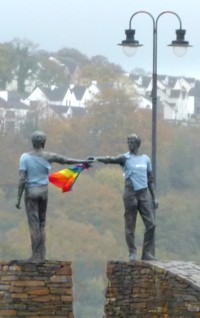Losing One's Religion
The relaxation of religious bigotry seems to be a factor in this apparent harmony. The Church of Ireland churches are largely uninhabited on both sides of the border. The Roman Catholic Church in particular has suffered serious setbacks this century.
First came the sexual abuse scandals; then the campaigns for gay marriage and legal abortion, both successful in the face of Church opposition. Most recently the Church opposed removing the prohibition on 'blasphemy' from the Irish Constitution so that this 'crime', more familiar in Muslim countries, would be no more.
The campaign took place during our time in Ireland and again the Church has been soundly defeated in a referendum. Pope Francis visited recently and his reception was inevitably compared with the previous Papal visit forty years earlier. Back then the Irish populous flocked to JPII in their millions and besieged his Papal Mass in a crush of humanity. This time the media reported; 'the streets were lined to one person deep'; and 'the St Patrick's day parade attracted bigger crowds'.
No wonder that at we were exhorted, by large a banner, to: Pray the Rosary for Ireland as part of upcoming Irish Rosary on the Coasts event, at which Dingle Bay was to be one point of costal gathering.
The Convent of the Presentation Nuns in Dingle
The white and gold banner by the gate exhorts us to: Pray the Rosary for Ireland
Back at home, after the event, I wondered how it had gone. The Catholic World Report told me:
| Thousands of Catholics gathered at over 270 locations on the Feast of Christ the King (25 November 2018) to pray the Rosary, seeking to stem the tide of abortion and other evils in what used to be the most Catholic country in the world.
The article goes to add: In recent years, Catholic Ireland has been bloodied by the sins of her clergy in sexual scandals one after the other. The faith, so embodied by her patron Saint Patrick, has plummeted to new lows. This is a new, spiritual version of the An Gorta Mòr (The Great Hunger). Yes, there is another kind of famine plaguing Ireland today. It is one wrought by the sins of man and not the soil. Like almost all western countries, Ireland has bought into a materialistic, self-absorbed, hedonistic form of secularism. Where the highest good in human existence is characterized and fantasized by a corrupted form of self-realization. Instead of exporting or giving and sanctifying and sacrificing to the world her innate spirituality, Ireland is now importing the modern creed of “what’s in it for me?” |
Standing against the tide seems an ill-chosen metaphor (like King Canute) and given that the Presentation Order features in a number of those disastrous 'sexual scandals' referred to, and not just in Ireland, they were named in Australia's Royal Commission into Institutional Responses to Child Sexual Abuse too, one might say: 'what goes around comes around'.

